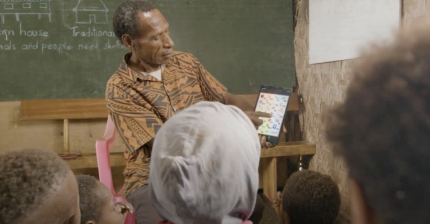
In a significant step towards improving the quality of life in remote areas, a new micro hydropower system has been installed in Hogave,Papua New Guinea, bringing reliable electricity to this remote village. This development comes amid ongoing rescue efforts in Enga Province following a devastating landslide.
The 20kW micro-hydro system was installed as part of a project initiated by a foreign foundation to reward the Hogave tribe for their dedication to forest conservation. The system now powers essential village facilities, including the local school, providing benefits previously unimaginable for the residents.
Kumoro Kima, a teacher at the village elementary school, highlighted the immediate impact on education. With electricity, he said he can use mobile devices and tablets as teaching aids. Lighting aldo allows students to study in the evenings, which wasn’t possible before.
David Kima, Founding Director of the Hogave Conservation Centre and a tribal elder, emphasized the economic advantages. “Previously, we used fuel from diesel generators, which constantly runs out quickly, so we had to send a vehicle up to Goroka town to transport the fuel. That’s 63 km, or about a two or three-hour drive. With the micro-hydro, the timing and costs of going up to town and coming back were reduced and cut down.”
The benefits of decentralized renewable energy are also evident in Mount Hagen, where a 120kW mini-hydro plant has been operational since 2005. This plant supplies clean energy to the Rondon Ridge Lodge and its surrounding community, boosting local tourism and creating jobs. The project was completed using local talent and resources, further embedding the benefits within the community.
Kere Kila, a local woman employed as a supervisor at the lodge, noted the broader economic impacts. ” Since I started working at the lodge, I see local women really benefit from the business. They get more income because they can sell their handicrafts to the tourists,” she said.
These hydropower projects showcase the potential for renewable energy to drive sustainable development in remote communities. Despite Papua New Guinea’s potential to generate 251GW of hydropower, the country produced only 327MW by 2023. Recent efforts have added 66MW, indicating progress toward the government’s goal of 70% renewable energy generation by 2030.
Bob Bates, owner of Rondon Ridge Lodge, called for more such initiatives. “There should be hundreds of these mini-hydro plants around the country, especially in the highlands. We’ve got the water, we’ve got the height, and we’ve got the skills to install them,” he said.
Source: IRENA


